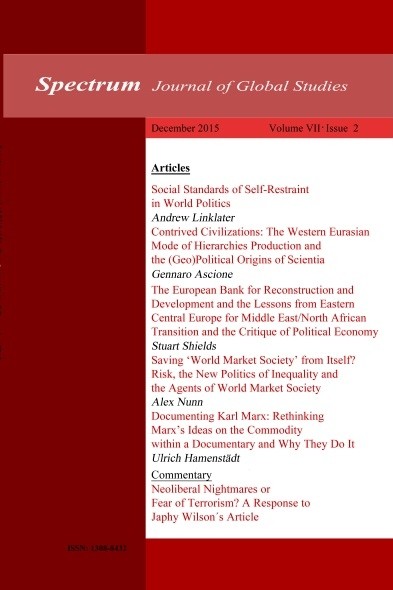International Relations, Historical Sociology and the Eurocentrism Debate
International Relations, Historical Sociology and the Eurocentrism Debate
Eurocentricism, Historical Sociology International Politics,
___
- Allinson, Jamie C., and Alexander Anievas. “The Uneven and Combined Development of the Meiji Restoration: A Passive Revolutionary Road to Capitalist Modernity.” Capital & Class 34:3 (2010): 469–90.
- Anievas, Alexander and Kerem Nı̇şancioğlu. How the West Came to Rule: The Geopolitical Origins of Capitalism. London: Verso, 2015.
- Beik, William. A Social and Cultural History of Early Modern France. Cambridge: Cambridge University Press, 2009.
- Beik, William. 2010. “Response to Henry Heller’s The Longue Duree of the French Bourgeoisie”, Historical Materialism, 18 (2): 117-122.
- Bhambra, G.K. Historical sociology, international relations and connected histories, Cambridge Review of International Affairs, 23:1(2010), 127-143.
- Brenner, Robert. “The Agrarian Roots of European Capitalism.” In The Brenner Debate: Agrarian Class Structure and Economic Development in Pre-Industrial Europe, edited by Trevor Henry Aston and C.H.E Philpin (Cambridge: Cambridge University Press, 1985), 213–327.
- Briggs, Robin. “The Academie Royale des Sciences and the Pursuit of Utility”, Past andPresent, 131:1(1991): 38–88.
- Chakrabarty, Dipesh. Provincializing Europe: Postcolonial Thought and Historical Difference, Princeton: Princeton University Press, 2008.
- Comninel, George. Rethinking the French Revolution: Marxism and the Revisionist Challenge. London: Verso, 1987.
- Dufour, Frédérick Guillaume. “Social-Property Regimes and the Uneven and Combined Development of Nationalist Practices.” European Journal of International Relations 13:4(2007): 583–604.
- Duzgun, Eren. “Property, Geopolitics and Eurocentrism: The Ottoman Empire and the ‘Great Divergence’”, Review of Radical Political Economics, forthcoming.
- Friedmann, Harriet. “Household Production and the National Economy: Concepts for the Analysis of Agrarian Formations.” Journal of Peasant Studies 7:2(1980): 158–84.
- Gerstenberger, Heide. Impersonal Power: History and Theory of the Bourgeois State. Translated by David Fernbach. Leiden: Brill, 2007.
- Halliday, Fred. Revolution in World Politics. London: Macmillan, 1999.
- Hobden, Steve & J.M. Hobson. (eds.) Historical Sociology of International Relations. Cambridge: Cambridge University Press, 2002.
- Hobson, J.M. What’s at stake in ‘Bringing Historical Sociology Back’ into International Relations? Transcending ‘Chronofetishism’ and ‘Tempocentrism’ in international relations', in Stephen Hobden and John M. Hobson (eds.), Historical Sociology of International Relations. Cambridge: Cambridge University Press, 2002, 3–41.
- Hobson, J.M. The Eastern Origins of Western Civilisation. Cambridge: Cambridge University Press, 2002.
- Hobson, J.M. The Eurocentric Conception of World Politics: Western International Theory, 1760–2010. Cambridge: Cambridge University Press, 2012.
- John Hobson, George Lawson and Justin Rosenberg. 2010. Historical Sociology, LSE Research Online, retrieved from www.eprints.lse.ac.uk/28016/1/Historical_sociology(LSERO.pdf, 01 February 2016. LaFrance, Xavier. “Citizens and Wage-Laborers: Capitalism and the Formation of a Working Class in France”, Unpublished Doctoral Thesis, York University, Canada, 2013.
- Lapointe, T. & Dufour, F. “Assessing the historical turn in IR: an anatomy of second wave historical sociology”, Cambridge Review of International Affairs, 25:1(2012), 97-121.
- Lacher, Hannes. Beyond Globalization: Capitalism, Territoriality and the International Relations of Modernity, London: Routledge, 2006.
- Lacher, Hannes. Polanyian Perspectives on Global History. Unpublished Paper, presented at Workshop: Beyond the Eurocentrism Debate, Max Planck Institute for Social Anthropology, Halle, 2015.
- Lawson, George and Hobson, John. “What is history in international relations?” Millennium: Journal of International Studies, 37:2(2008): 415-435.
- Matin, Kamran. Recasting Iranian Modernity: International Relations and Social Change, London: Routledge, 2013.
- Miller, Stephen. “French Absolutism and Agricultural Capitalism, Historical Materialism, 20:4(2012): 141-162.
- Morton, Adam David. Unravelling Gramsci: Hegemony and Passive Revolution in the Global Political Economy. Reading Gramsci. London: Pluto Press, 2007
- Parker, David. Class and State in Ancien Regime France: The Road to Modernity? Routledge, 1996.
- Polanyi, Karl. The Great Transformation. Boston: Beacon Press, 1957a.
- Polanyi, Karl. “The Economy as Instituted Process.” In Trade and Market in the Early Empires: Economies in History and Theory, edited by Karl Polanyi, Conrad M. Arensberg, and Harry W. Pearson, 243–70. New York: The Free Press, 1957b.
- Polanyi, Karl. The Livelihood of Man. Edited by Harry W Pearson. New York: Academic Press, 1977.
- Post, Charles. “Capitalism, Laws of Motion and Social Relations of Production.” Historical Materialism, 21:4(2013): 71–91.
- Rosenberg, Justin. The Empire of Civil Society: A Critique of the Realist Theory of International Relations. Verso, 1994.
- Rosenberg, Justin. “Why Is There No International Historical Sociology?” European Journal of International Relations 12:3(2006): 307–40.
- Rosenberg, Justin. 2013. “The ‘philosophical premises’ of uneven and combined development”, Review of International Studies, 39:3(2013): 569-597.
- Teschke, Benno. The Myth of 1648: Class, Geopolitics, and the Making of Modern International Relations. Verso, 2003.
- Teschke, Benno. “Advances and Impasses in Fred Halliday’s International Historical Sociology: A critical appraisal”. International Affairs, 87:5(2011): 1087-1106.
- Teschke, Benno. “IR Theory, Historical Materialism and the False Promise of International Historical Sociology”. Spectrum: Journal of Global Studies, 6:1(2015): 1-66.
- Vries, Jan de. The Economy of Europe in an Age of Crisis, 1600-1750. Cambridge: Cambridge University Press, 1976
- Wood, Ellen Meiksins,. “Eurocentric Anti-Eurocentrism.” Against the Current, 92(2001): 29–35.
- ISSN: 1308-8432
- Başlangıç: 2009
- Yayıncı: Dış Politika ve Uluslararası İlişkiler Derneği
Uneven and Combined Development in the Longue Durée: Beyond World-System Analysis?
Thoughts on How the West Came to Rule
International Relations, Historical Sociology and the Eurocentrism Debate
Why Europe? Anti-Eurocentric Theory, History, and the Rise of Capitalism
Alexander ANİEVAS, Kerem NİŞANCIOĞLU
The Costs of Weaponizing Emancipatory Politics: Constituting what is Constitutive of Capitalism
